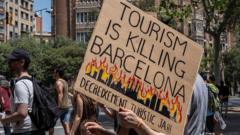The vibrant streets of Barcelona were filled with passionate protesters on Sunday as locals called for an end to the overwhelming presence of tourism in their beloved city. Holding banners that demanded "Go Home!" to the tourists filming their demonstration, they expressed a deep frustration that has been brewing amid an influx of visitors saturating the city's attractions. Street cafés, usually a serene haven, turned into battlegrounds where bemused patrons found themselves unwittingly soaking wet from water pistols wielded by protesters. Slickers covered luxury stores, proclaiming "Your AirBnB used to be my home."
With tourism being an economic cornerstone for Spain, locals feel increasingly marginalized as the crowds swell beyond manageable levels. Marina, one of the protest leaders, bemoaned the exorbitant rent hikes driven by AirBnB properties and expats seeking the sun. "We cannot live in this city anymore," she lamented, pointing to signs that called for the banning of cruise ships, with one graphic declaring that over-tourism is "killing" the city.
As the protesters wound their way toward the Sagrada Familia, a renowned architectural masterpiece by Gaudi, they voiced a dual message—the need for sustainable tourism that considers the local population. Young marine biologist Elena noted, "It's about managing tourism better," emphasizing that while individual tourists aren't the enemy, the existing system creates an untenable situation for residents, especially youth struggling with the cost of living.
The plight of residents isn't limited to young professionals; it affects seniors as well. Eighty-year-old Pepi Viu, recently evicted from her home of nearly ten years, is now seeking refuge in a hostel amid a rental market that has skyrocketed almost 70% since she last sought housing. "There's only tourist flats now, but we residents need somewhere to live!" she expressed heartbreakingly.
In the Gothic quarter, Joan Alvarez, an occupant of a long-term rental under threat of eviction, stands his ground against the growing tide of tourist accommodations. "It's not just about the money; it's about principle," he asserted, stressing that the essence of Barcelona is being diminished by the unyielding rise in tourism and rental conversions that push locals out.
On the side of the property owners, Jesus Pereda, a landlord managing two tourist flats near bustling attractions, feels scapegoated for the housing crisis. He believes that the influx of 'digital nomads' contributes more significantly to rising rents than tourists themselves do. "We're just an easy enemy," he lamented, voicing concerns that a blanket ban on short-term rentals without consideration of the underlying economic factors would negatively impact many.
The crescendo of protest culminated around the Sagrada Familia with chants ringing out in the local slang, and as smoke flared from firecrackers, police formed barriers to contain the situation. Similar protests echoed across Spain, along with some in Portugal and Italy, as residents from various nations expressed a shared concern over the balance between tourism's economic benefits and the preservation of local life.
Despite the tensions, tourism in Spain is slated for another record summer, leaving questions on how cities can address growing frustrations while continuing to welcome visitors.
With tourism being an economic cornerstone for Spain, locals feel increasingly marginalized as the crowds swell beyond manageable levels. Marina, one of the protest leaders, bemoaned the exorbitant rent hikes driven by AirBnB properties and expats seeking the sun. "We cannot live in this city anymore," she lamented, pointing to signs that called for the banning of cruise ships, with one graphic declaring that over-tourism is "killing" the city.
As the protesters wound their way toward the Sagrada Familia, a renowned architectural masterpiece by Gaudi, they voiced a dual message—the need for sustainable tourism that considers the local population. Young marine biologist Elena noted, "It's about managing tourism better," emphasizing that while individual tourists aren't the enemy, the existing system creates an untenable situation for residents, especially youth struggling with the cost of living.
The plight of residents isn't limited to young professionals; it affects seniors as well. Eighty-year-old Pepi Viu, recently evicted from her home of nearly ten years, is now seeking refuge in a hostel amid a rental market that has skyrocketed almost 70% since she last sought housing. "There's only tourist flats now, but we residents need somewhere to live!" she expressed heartbreakingly.
In the Gothic quarter, Joan Alvarez, an occupant of a long-term rental under threat of eviction, stands his ground against the growing tide of tourist accommodations. "It's not just about the money; it's about principle," he asserted, stressing that the essence of Barcelona is being diminished by the unyielding rise in tourism and rental conversions that push locals out.
On the side of the property owners, Jesus Pereda, a landlord managing two tourist flats near bustling attractions, feels scapegoated for the housing crisis. He believes that the influx of 'digital nomads' contributes more significantly to rising rents than tourists themselves do. "We're just an easy enemy," he lamented, voicing concerns that a blanket ban on short-term rentals without consideration of the underlying economic factors would negatively impact many.
The crescendo of protest culminated around the Sagrada Familia with chants ringing out in the local slang, and as smoke flared from firecrackers, police formed barriers to contain the situation. Similar protests echoed across Spain, along with some in Portugal and Italy, as residents from various nations expressed a shared concern over the balance between tourism's economic benefits and the preservation of local life.
Despite the tensions, tourism in Spain is slated for another record summer, leaving questions on how cities can address growing frustrations while continuing to welcome visitors.





















